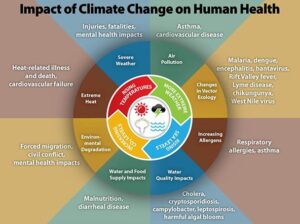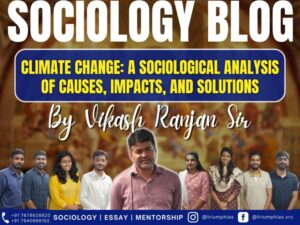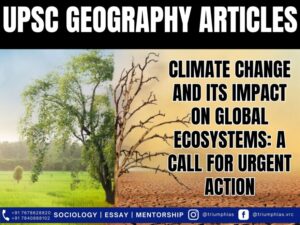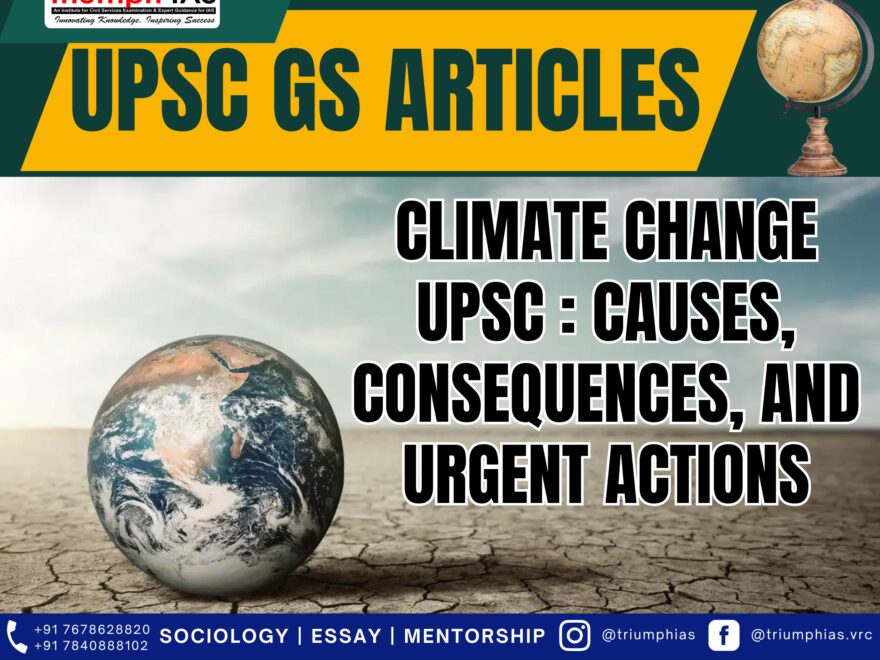Climate Change UPSC
(Relevant for General Studies Paper | Prelims/Mains)

What is Climate Change?
Climate change refers to enduring variations in global temperatures and weather events. While such variations can naturally occur due to factors like volcanic activity or solar fluctuations, the primary force behind recent climate change has been human activity, chiefly the combustion of fossil fuels such as coal, oil, and natural gas.
Burning these fuels leads to the release of greenhouse gases like carbon dioxide and methane, which act like a thermal cover around the Earth, trapping heat and leading to a rise in temperatures. Major sources of these gases include not just transportation and heating, but also deforestation and certain types of industrial and agricultural practices.
The Human Factor in Global Warming:
Extensive scientific evidence shows that human-induced activities have been the predominant cause of global warming over the past 200 years. These activities have led to a rapid increase in global temperatures, the fastest in at least the last two millennia. The Earth’s average surface temperature is now approximately 1.1°C higher than it was prior to the Industrial Revolution, and the last decade (2011-2020) was the warmest ever recorded.
Beyond Just Warming Temperatures:
While many focus on the temperature increase as the primary indicator of climate change, it’s only part of the picture. Earth is a complex system, and changes in one component can influence the entire ecosystem. We are already witnessing severe consequences such as increased droughts, water shortages, wildfires, flooding, and more, all related to the shifting climate.
Varied Impact on Communities:
The repercussions of climate change are felt differently across populations. Vulnerable communities, like those in small island countries or in the developing world, face particularly dire circumstances like rising sea levels and persistent droughts. These conditions have forced entire communities to relocate and have exacerbated food shortages. In the coming years, the number of “climate refugees” is expected to rise.
The Urgency of Limiting Temperature Rise:
Multiple UN reports and scientific agreements advocate for capping global temperature rise to 1.5°C above pre-industrial levels to avoid disastrous consequences. However, current policies are leading us toward a temperature increase of around 2.8°C by century’s end. Large emitters like China, the USA, India, the European Union, Indonesia, Russia, and Brazil are particularly responsible and need to take urgent action.
Solutions and Immediate Actions Required:
There are many actionable solutions that can provide economic gains while mitigating climate risks. International frameworks like the UN’s Sustainable Development Goals and the Paris Agreement offer guidelines for emissions reduction, adaptation, and financing. Switching to renewable energy sources is crucial, and to stay below 1.5°C warming, fossil fuel usage needs drastic cuts. In terms of adaptation, investments in early warning systems and other protective measures can offer high returns.
Financial Considerations:
Taking action against climate change will require substantial investment from both governments and the private sector. However, the cost of inaction far outweighs the price of proactive measures. Industrialized nations must honor their commitment to provide $100 billion per year to help developing countries transition to sustainable practices and adapt to climate changes.
For a deeper understanding of the specific terms related to climate change, consider referring to the Climate Dictionary.
Reference The Hindu
Related Blogs…
 |
 |
Frequently Asked Questions:
1. Question: What is the primary driver of recent climate change, and how does it affect global temperatures?
Answer: Human activities, particularly the combustion of fossil fuels, release greenhouse gases that trap heat, leading to a rise in global temperatures.
2. Question: How has climate change impacted vulnerable communities, and what specific challenges do they face?
Answer: Vulnerable communities, such as those in small island countries and the developing world, experience rising sea levels, droughts, food shortages, and forced relocations due to climate change.
3. Question: What is the recommended global temperature limit to avoid disastrous consequences, and what actions are required to achieve this goal?
Answer: The recommended temperature limit is 1.5°C above pre-industrial levels. To achieve this, drastic cuts in fossil fuel usage, transitioning to renewable energy, and adherence to international agreements like the Paris Agreement are essential.
4. Question: What financial considerations are associated with addressing climate change, and why is it crucial for industrialized nations to provide financial support to developing countries?
Answer: Addressing climate change requires significant investments. Industrialized nations must provide $100 billion per year to help developing countries transition to sustainable practices and adapt to climate changes, as the cost of inaction is far higher.
GS Related Practices Questions…
To master these intricacies and fare well in the Sociology Optional Syllabus, aspiring sociologists might benefit from guidance by the Best Sociology Optional Teacher and participation in the Best Sociology Optional Coaching. These avenues provide comprehensive assistance, ensuring a solid understanding of sociology’s diverse methodologies and techniques.
META TAGS:
Climate change UPSC, climate change, global warming, greenhouse gases, human activities, temperature rise, consequences, vulnerable communities, urgent actions, renewable energy, Paris Agreement, sustainable development, climate finance, Climate change environmental,

Why Vikash Ranjan’s Classes for Sociology?
Proper guidance and assistance are required to learn the skill of interlinking current happenings with the conventional topics. VIKASH RANJAN SIR at TRIUMPH IAS guides students according to the Recent Trends of UPSC, making him the Best Sociology Teacher for Sociology Optional UPSC.
At Triumph IAS, the Best Sociology Optional Coaching platform, we not only provide the best study material and applied classes for Sociology for IAS but also conduct regular assignments and class tests to assess candidates’ writing skills and understanding of the subject.
Choose The Best Sociology Optional Teacher for IAS Preparation?
At the beginning of the journey for Civil Services Examination preparation, many students face a pivotal decision – selecting their optional subject. Questions such as “which optional subject is the best?” and “which optional subject is the most scoring?” frequently come to mind. Choosing the right optional subject, like choosing the best sociology optional teacher, is a subjective yet vital step that requires a thoughtful decision based on facts. A misstep in this crucial decision can indeed prove disastrous.
Ever since the exam pattern was revamped in 2013, the UPSC has eliminated the need for a second optional subject. Now, candidates have to choose only one optional subject for the UPSC Mains, which has two papers of 250 marks each. One of the compelling choices for many has been the sociology optional. However, it’s strongly advised to decide on your optional subject for mains well ahead of time to get sufficient time to complete the syllabus. After all, most students score similarly in General Studies Papers; it’s the score in the optional subject & essay that contributes significantly to the final selection.
“A sound strategy does not rely solely on the popular
Opinion of toppers or famous YouTubers cum teachers.”
It requires understanding one’s ability, interest, and the relevance of the subject, not just for the exam but also for life in general. Hence, when selecting the best sociology teacher, one must consider the usefulness of sociology optional coaching in General Studies, Essay, and Personality Test.
The choice of the optional subject should be based on objective criteria, such as the nature, scope, and size of the syllabus, uniformity and stability in the question pattern, relevance of the syllabic content in daily life in society, and the availability of study material and guidance. For example, choosing the best sociology optional coaching can ensure access to top-quality study materials and experienced teachers. Always remember, the approach of the UPSC optional subject differs from your academic studies of subjects. Therefore, before settling for sociology optional, you need to analyze the syllabus, previous years’ pattern, subject requirements (be it ideal, visionary, numerical, conceptual theoretical), and your comfort level with the subject.
This decision marks a critical point in your UPSC – CSE journey, potentially determining your success in a career in IAS/Civil Services. Therefore, it’s crucial to choose wisely, whether it’s the optional subject or the best sociology optional teacher. Always base your decision on accurate facts, and never let your emotional biases guide your choices. After all, the search for the best sociology optional coaching is about finding the perfect fit for your unique academic needs and aspirations.
To master these intricacies and fare well in the Sociology Optional Syllabus, aspiring sociologists might benefit from guidance by the Best Sociology Optional Teacher and participation in the Best Sociology Optional Coaching. These avenues provide comprehensive assistance, ensuring a solid understanding of sociology’s diverse methodologies and techniques. Sociology, Social theory, Best Sociology Optional Teacher, Best Sociology Optional Coaching, Sociology Optional Syllabus.
Best Sociology Optional Teacher, Sociology Syllabus, Sociology Optional, Sociology Optional Coaching, Best Sociology Optional Coaching, Best Sociology Teacher, Sociology Course, Sociology Teacher, Sociology Foundation, Sociology Foundation Course, Sociology Optional UPSC, Sociology for IAS,
Follow us :
🔎 https://www.instagram.com/triumphias
🔎https://www.youtube.com/c/TriumphIAS
https://t.me/VikashRanjanSociology
Find More Blogs
| Compare and contrast Karl Marx’s and Max weber’s | Karl Marx- Historical Materialism |
| Talcott Parsons : Social system | Scope of the subject and comparison with other social sciences |




